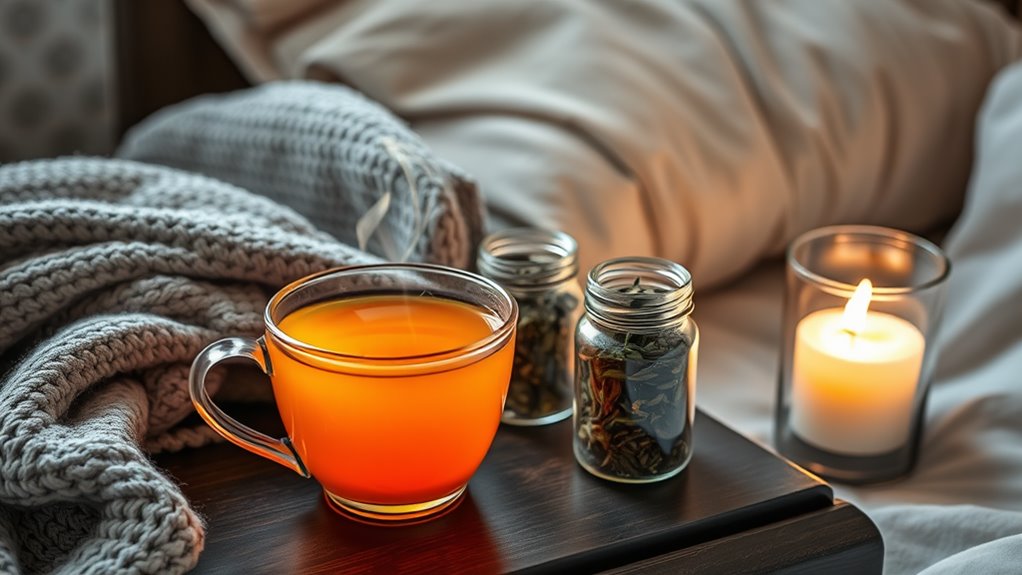Experts Swear by These Bedtime Teas Tips-Here’s Why
Did you know that sipping on certain herbal teas before bed can significantly improve your sleep quality? Experts emphasize the calming effects of ingredients like chamomile and valerian root. These bedtime teas not only help you unwind but also create a soothing nighttime ritual. Curious about how to choose the right ingredients and prepare the perfect cup? Let’s explore the essential tips that can transform your nightly routine.
The Benefits of Bedtime Teas for Sleep
When it comes to winding down after a long day, bedtime teas can be your secret weapon for a good night’s sleep.
Many herbal blends, like chamomile and valerian root, work wonders in promoting relaxation and reducing anxiety.
Research shows that sipping on these soothing teas can lower cortisol levels, helping you unwind.
The warm liquid also aids digestion, which can prevent discomfort during the night.
Plus, the ritual of preparing and enjoying a cup of tea signals to your body that it’s time to sleep.
Incorporating bedtime teas into your nightly routine can enhance both sleep quality and overall wellness.
Embrace bedtime teas, and you might just find yourself drifting off more easily.
Choosing the Right Herbal Ingredients
Choosing the right herbal ingredients for your bedtime tea can significantly enhance your sleep experience.
Look for calming herbs like chamomile, known for its soothing properties, or valerian root, which may help reduce anxiety. Lavender adds a delightful aroma and can promote relaxation. Passionflower is another great option, as it’s linked to improved sleep quality. You might also consider lemon balm, which can ease stress and enhance mood. Incorporating specific herbal teas into your nightly routine can lead to transformative results.
Explore calming herbs like chamomile, valerian root, and lavender to enhance relaxation and improve sleep quality in your bedtime tea.
Always remember to check for allergies and consult with a healthcare professional if you’re pregnant or on medication.
With the right ingredients, your bedtime tea can become a powerful sleep aid.
Timing Your Tea Consumption
To maximize the benefits of your bedtime tea, it’s essential to consider the timing of your consumption.
Ideally, you should drink your tea about 30 to 60 minutes before you plan to sleep.
This window allows your body to absorb the calming compounds while also giving you time to unwind.
If you drink it too close to bedtime, you might find yourself waking up for bathroom trips, disrupting your sleep.
Experiment with different times to see what works best for you, but aim for consistency.
A regular routine can enhance relaxation and signal your body that it’s time to wind down.
Incorporating chamomile tea into your evening ritual can further promote improved sleep and reduce anxiety, making it a beneficial choice for your bedtime routine.
Preparing Your Bedtime Tea Ritual
To create a soothing bedtime tea ritual, start by selecting herbal ingredients known for their calming properties, like chamomile or lavender. Chamomile tea is particularly effective for promoting relaxation and sleep due to its natural sedative effects. Next, use optimal brewing techniques to extract the best flavors and benefits from your chosen herbs. Finally, set a cozy atmosphere with soft lighting and comfortable seating to enhance your relaxation experience.
Selecting Herbal Ingredients
When it comes to crafting your perfect bedtime tea, selecting the right herbal ingredients is essential for promoting relaxation and restful sleep. Consider these popular herbs known for their calming effects:
| Herb | Benefits | Usage Suggestions |
|—————|———————————-|——————————|
| Chamomile | Reduces anxiety, promotes sleep | Brew for 5-10 minutes |
| Lavender | Calms nerves, enhances relaxation| Add dried flowers to tea |
| Lemon Balm | Eases stress, improves mood | Combine with chamomile |
Experiment with combinations and find what resonates with you. A well-chosen blend can transform your nightly routine into a soothing ritual. Enjoy your tea!
Optimal Brewing Techniques
Crafting the perfect bedtime tea goes beyond selecting the right herbs; the brewing process plays a vital role in maximizing their benefits.
To enhance your tea ritual, consider these optimal brewing techniques:
-
Water Temperature: Use water just off the boil (around 200°F) for delicate herbs to preserve their flavors and properties.
-
Steeping Time: Allow your tea to steep for 5-7 minutes, enabling the herbs to release their full potential.
-
Cover It Up: Keep your tea covered while steeping to trap essential oils and aromas, enhancing your overall experience.
These steps ensure you enjoy a soothing cup that promotes relaxation and restful sleep.
Setting a Cozy Atmosphere
Creating a cozy atmosphere for your bedtime tea ritual transforms it into a calming experience that prepares your mind and body for rest. Consider these tips to enhance your environment:
| Element | Suggestion |
|——————|——————————|
| Lighting | Use soft, warm lights |
| Aroma | Add calming scents (lavender)|
| Sound | Play gentle, soothing music |
| Temperature | Keep the room comfortably cool|
| Seating | Choose a comfy chair or nook |
Incorporating these elements helps signal your brain that it’s time to wind down, making your tea ritual a delightful precursor to sleep.
Enhancing Flavor Without Caffeine
If you want to enhance your bedtime tea without the jitters of caffeine, consider using a variety of herbal ingredients like chamomile or peppermint for added flavor.
Natural sweeteners such as honey or stevia can elevate your brew without overpowering its soothing qualities. Plus, paying attention to the right temperature and brewing time can make all the difference in extracting the best flavors from your chosen ingredients.
For a truly calming experience, try adding a favorite chamomile tea to your routine, as chamomile is known for its relaxing properties.
Herbal Ingredient Options
When it comes to bedtime teas, herbal ingredients offer a delightful way to enhance flavor without the jolt of caffeine.
You can create a soothing cup by incorporating these flavorful options:
-
Chamomile: Known for its calming properties, it lends a gentle floral taste.
-
Lavender: With its aromatic scent, it adds a relaxing touch that promotes sleep.
-
Peppermint: This invigorating herb brings a refreshing zing, perfect for digestion.
Using these herbs not only elevates your tea experience but also supports relaxation, making your bedtime routine even more enjoyable and effective.
Natural Sweeteners to Use
To enhance the flavor of your bedtime tea without adding caffeine, consider using natural sweeteners that not only taste great but also bring their own health benefits.
Honey, for instance, has soothing properties and can help with sleep quality.
Stevia offers a calorie-free option with no impact on blood sugar levels.
Maple syrup, packed with antioxidants, adds a unique flavor profile.
Coconut sugar, rich in minerals, can be a delightful alternative too.
Experiment with these options to find the perfect balance, ensuring your tea is both delicious and supportive of your overall well-being as you wind down for the night.
Temperature and Brewing Tips
While enjoying your bedtime tea, the temperature and brewing time play crucial roles in maximizing flavor without introducing caffeine.
Here are some key tips to enhance your experience:
-
Water Temperature: Heat water to around 200°F for herbal teas; this extracts rich flavors without bitterness.
-
Brewing Time: Steep your tea for 5-7 minutes, allowing the flavors to develop fully.
-
Cover Your Cup: Use a lid while brewing; it traps essential oils and aromas, deepening the flavor profile.
Additional Tips for a Restful Night’s Sleep
How can you create an environment that promotes a restful night’s sleep?
Start by dimming the lights an hour before bed to signal your body it’s time to wind down.
Keep your bedroom cool, ideally between 60-67°F, as this temperature range is linked to better sleep quality.
Minimize noise with earplugs or white noise machines, and invest in blackout curtains to block out light.
Establish a calming bedtime routine—try reading or practicing relaxation techniques.
Avoid screens at least 30 minutes before sleep, as blue light can interfere with melatonin production.
Incorporating relaxing evening rituals can further enhance your sleep quality and mental well-being.
Implement these tips, and you’ll likely enjoy a more restful night.

